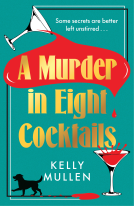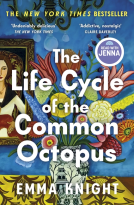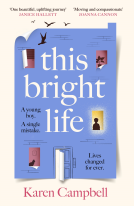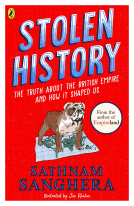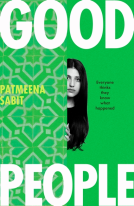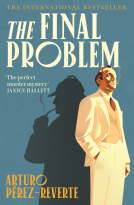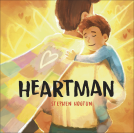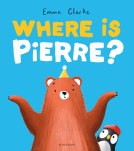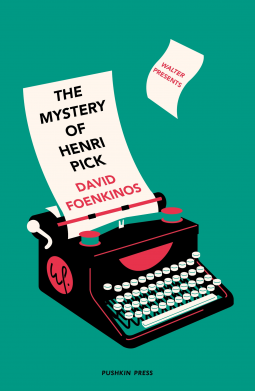
The Mystery of Henri Pick
by David Foenkinos
This title was previously available on NetGalley and is now archived.
Send NetGalley books directly to your Kindle or Kindle app
1
To read on a Kindle or Kindle app, please add kindle@netgalley.com as an approved email address to receive files in your Amazon account. Click here for step-by-step instructions.
2
Also find your Kindle email address within your Amazon account, and enter it here.
Pub Date 1 Sep 2020 | Archive Date 17 Jun 2020
Talking about this book? Use #TheMysteryofHenriPick #NetGalley. More hashtag tips!
Description
In the small town of Crozon in Brittany, a library houses manuscripts that were rejected for publication: the faded dreams of aspiring writers. Visiting while on holiday, young editor Delphine Despero is thrilled to discover a novel so powerful that she feels compelled to bring it back to Paris to publish it.
The book is a sensation, prompting fevered interest in the identity of its author - apparently one Henri Pick, a now-deceased pizza chef from Crozon. Sceptics cry that the whole thing is a hoax: how could this man have written such a masterpiece? An obstinate journalist, Jean-Michel Rouche, heads to Brittany to investigate.
By turns farcical and moving, The Mystery of Henri Pick is a fast-paced comic mystery enriched by a deep love of books - and of the authors who write them.
Curley #108
Advance Praise
"Written with humour, wit and intelligence, it's set in a world of books and publishing. I really enjoyed it." — TripFiction
"The Mystery of Henri Pick manages the great gap between levity and profundity, between humour and seriousness. A beautiful farce." — Le Figaro Littéraire
Available Editions
| EDITION | Other Format |
| ISBN | 9781782275824 |
| PRICE | $16.95 (USD) |
| PAGES | 288 |
Average rating from 73 members
Featured Reviews
The mystery of Henry Pick is indeed a mystery which will keep you spellbound to the end. It is a fast paced story which takes a lot of turns. A failed writer and his wife, who is an assistant editor whose main job is to reject unsolicited scripts, stumble across a winning script at unlikeliest of the places. A library, meant for scripts which have been rejected by the publishers too many times for the author to give up and leave the script here probably as a pilgrimage to their writing. The script had name of a deceased local pizza maker who his family thought is not capable of writing even a sentence. Once the book is published, the world can neither get enough of the book nor of the life and times of this unknown and unlikely author.
The book impacts numerous lives negatively and positively with hundreds of curious readers suddenly pouring in this sleepy town changing futures of the inhabitants some who enjoy the limelight and some who avoid it.
This is a beautifully written book, characters who display deep thoughts and pragmatic reactions to situations. Sometimes the characters are too real for comfort of some readers and display flaws that we all have.
 Richard B, Reviewer
Richard B, Reviewer
<i>The Mystery of Henry Pick</i> is a pleasant work of fiction about the fortuitous discovery of a masterpiece in the rejected books section of a small-town library. Delphine Despero, an up and coming book editor, and her boyfriend Frédéric Koskas, an unknown author, find the book and its author and then promote the book to bestselling status. <i>The Mystery of Henry Pick</i> is written by David Foenkinos, a screenwriter and director who has 14 novels to his credit.
Jean-Pierre Gourvec is inspired to create “a library of rejected books” in Crozon, Brittany. Delphine Despero, a book editor, happens to spend all her summers at her parent’s home near Crozon. On one holiday with her boyfriend she learns of Gourvec’s library and they decide to visit. While browsing through the shelves they find what they feel is a potential masterpiece. Most amazingly, the author is a man who runs the local pizzeria and has never been known to read books. Henry Pick has died by the time Delphine goes looking for him and even Henry’s wife is surprised to hear he has written a book. Delphine and Frédéric use the circumstances surrounding locating the book to build its notoriety. In spite of all their best efforts there are still detractors in industry who feel that they must solve the mystery surrounding Henry Pick and his hard to believe literary triumph.
The novel is both informative and interesting. I now understand more about book promotion and how the content of a novel is not necessarily why books do well in the marketplace. Now awards, accolades, author notoriety, backstories and reviews make a lot more sense. Content wise, the many twists and turns are part of the book’s salvation and why it is so interesting.
This is a very pleasant story. Many sad people find consolation in each other’s company. Much like the rejected novels, many people who have been cast aside in previous relationships do eventually find happiness. Overall it is very uplifting.
Although overall, I like the novel, I do get lost in all the characters. There are too many side stories. I feel the novel can be shorter and just as effective.
I highly recommend this book to people love a pleasant story with twists and turns. I give it a 4 on 5. I want to thank Net Galley and Steerforth Press for providing me with a digital copy of the novel in exchange for a fair review
This novel was originally published in France in 2016 by Foenkinos and the English translation is done in 2020 by Sam Taylor and we can only say thank you to Mr Taylor for the fine work that he did in translating this amazing tale from Foenkinos for the English speaking world to enjoy.
This book is the unravelling of the mystery of whether a certain Monsieur Henri Pick (now deceased) was indeed the author of a magnificent piece of literature that sweeps the world with its intense telling of the end of a love affair and the death of Russian author Pushkin. Delphine Despero is the editor who can spot a champion manuscript from amongst the piles and makes the great discovery of Picks book amongst the library of rejected manuscripts in the library in Crozon, and she falls in love with Frederic Koskas, author of the not so brilliantly received book The Bathtub. Taking the manuscript from the library back to her publishing house in Paris, she has it published, after convincing Picks widow that he did indeed write the book, there is cult-like regard for Pick writing the book and the story of the found manuscript as part of the mystic of the novel and a certain level of doubt that Pick was the author as he spent his life in relative obscure mediocrity, making pizzas and living his life with his small family in a small town in northern France. Along the way of the novel, we are privy to the effects that the publication of Picks book has on his family and the members of the town in which he resided which are far-reaching and powerful.
This novel is by turn painful and funny and insightful to the whims of human fancy. It is well-paced, never rushing the story but nor does it ever belabour any one storyline. It is clever in never revealing too much of the mystery and throwing in the odd red herring in the barrel to keep the reader guessing as to the truth behind the origins of the novel. Foenkinos creates an enigmatic story that keeps twisting and turning whilst exploring the publishing world and the gullibility of the buying public and explains why we can have 125 million copies sold of 50 Shades of Grey such as the like that E.L. James produced.
The Mystery of Henri Pick could be viewed as a kind of love story to the wannabe writers of the world and their unpublished pieces that are undoubtedly diamonds in the rough having been overlooked by the publishing world. Its power is in its ability to keep the revelation to the very last paragraphs and they leave the reader shouting with surprise and elation at knowing the truth which is completely unexpected and simply stellar.
Fun, engaging and entertaining, it is worthy of the investment of time to read.
 Tara C, Librarian
Tara C, Librarian
Perhaps this book is meant for English majors to sit around a discuss what makes a good book? A good story? The Mystery of Henri Pick feels like Daniel Pennac's Rights of the Reader meets a "how to get published" manual for aspiring writers.
Is there a gimmick? What sells a story? Literature is personal, so it would seem that publishers aren't so much concerned with the quality of the writing, but if they can sell the book. Seriously, literature seminars everywhere should read and discuss this book.
 The Idle Woman ., Reviewer
The Idle Woman ., Reviewer
Imagine a library of rejected manuscripts, where failed books find a new home. Actually, it doesn't take too much imagination, because such a place really does exist: the Brautigan Library in Vancouver, Washington, named after the author Richard Brautigan, who invented such a library in his novel The Abortion. In The Mystery of Henri Pick, the librarian Jean-Pierre Gourvec forms a similar collection in his small Breton town of Crozon. For decades, shelves of rejected stories slumber in the back of the town library until, some years after Gourvec's death, something remarkable happens. Up-and-coming young editor Delphine Despero, at home on a visit to her parents, visits the library of rejected manuscripts with her author boyfriend. They discover a remarkable text - a masterpiece, signed by one Henri Pick. Snapped up by the publishing world, this book becomes a sensation, less for its content than for the romantic story of its creation. But how did the late Pick, a humble pizza chef with no discernable literary leanings, come to create such a beautiful novel? As Crozon adjusts to its new literary fame, the novel begins to affect the lives of those connected with it. And then a maverick journalist raises a controversial prospect. What if the novel isn't really by Pick at all?
Jean-Michel Rouche isn't trying to be difficult. He just wants to find out the truth. It hasn't always been like that: in his past life, as a ruthless literary critic, he was notoriously abrasive, shattering pretensions and making enemies without a care in the world, confident that his status would protect him. Now he's just a fading middle-aged journalist with a nose for a story, and he's pretty sure that the mild-mannered Henri Pick couldn't possibly have produced the sensational Last Hours of a Love Affair. But the problem is that the world wants to believe in Pick's authorship. People love the idea of a man quietly writing a masterpiece in the quiet hours between making pizza dough and opening his restaurant. They love the idea that he was blind to his own brilliance, and that he consigned his manuscript to the library of rejected books without even trying to get it published. Pick becomes an everyman: an avatar for everyone who's ever dreamed that they have a novel in them (and haven't we all?). His story gives hope to those whose novels have been rejected, and appeals to the romantics. Pilgrims begin flooding to Crozon's cemetery, to the bemusement of the stolid locals.
And no one, perhaps, is more bemused than Pick's wife Madeleine. Her late husband apparently had hidden depths that he never shared with her. Why? And yet, she begins to think it possible. Couldn't the novel relate to their brief separation when they were seventeen which, at the time, felt like a towering drama? As journalists and TV crews clamour for her story, Madeleine's humble life is suddenly thrown into a new light. And she's not the only one who is changed. The novel begins to shift the foundations of other lives as well. There's Madeleine and Henri's daughter Joséphine, whose husband has walked out on her, whose daughters have moved to Berlin, and whose fragile pride is currently founded on her lingerie shop in Rennes. There's Magali Croze, Gourvec's successor as Crozon's librarian, who begins to reassess her faded relationship with her husband. There's Rouche, whose quest gives his career a much-needed boost and opens the possibility of a more rewarding future. And of course there's Delphine too. The success of Pick's novel has boosted her career and given her reputation new lustre, while her boyfriend Frédéric struggles to get recognition for his own (less glamorous) literary efforts. Every one of these people will be transformed by the story of Pick's novel. Some of them think they can solve the mystery. But who will be proven right?
Foenkinos's novel has been a massive success in France: it's already been turned into a film, which came out last year with Fabrice Luchini in the role of Rouche. Its appeal is obvious: this is a novel written about books, by someone who loves books, for other people who love books. It mixes reality with fiction: for example, Delphine is credited with recognising the brilliance of Laurence Binet's HHhH, which Grasset did indeed publish; and I imagine there are plenty more Easter eggs for those familiar with the world of French publishing. I have a sneaking suspicion that there are also stylistic Easter eggs. I was struck by the frequent use of ellipses to show when characters pause or are silent ('...'). Could this be a playful reference back to the start of the novel, when Gourvec longs for an assistant to whom he can chat about the use of ellipses in Céline? Is this the kind of thing you find in Céline? I suspect it's a literary in-joke - the kind that makes you wonder how many others you're too poorly-read to spot. But I stress: there's nothing pretentious about the novel. It's just a love letter to books of all sorts. Foenkinos tells us about the novels his characters love: Rouche is working his way through Roberto Bolaño's 2666, while (in the 'past') we see Gourvec assessing the visitors to his library and carefully selecting what he thinks will be the perfect book to awaken their passion for reading (he judges that his assistant Magali would adore The Lover by Marguerite Duras). There are lots of references which lead you off down happy rabbit-roles of research: I ended up taking a break about halfway through to listen to Barbara's song Göttingen, after it sparks a host of teenage memories for one character.
I really did enjoy this little book. It's very French in ways I find hard to define: something to do with the cosy languor of small-town life; the focus on middle-aged characters and their romantic tribulations; the joy taken in literature; and the way that a sudden discovery offers a prism for modest people to reassess their lives. In many ways it reminded me of Grégoire Delacourt's The List of My Desires, another novel about a small-town life transformed by unexpected prosperity, although The Mystery of Henri Pick is more upbeat. Credit must go to Sam Taylor for a sparky translation which even adds little verbal jokes that presumably don't work in French ('Delphine could already imagine readings unpicking Pick's life'). It's a pleasure to read: heartwarming, playful, but also sensitive to the hopes and dreams of its assorted characters. And the ending is just perfect. If you're familiar with modern European literature, there are lots of references here to make you smile; but if you just want a good, solid story of love and mystery, this will work equally well. Who doesn't love a story about an underdog producing a masterpiece that takes the literary world by storm? Deliciously Gallic.
As a small P.S., this is the first book in a series that Pushkin will publish in association with Walter Presents, who also work with Channel 4 to 'curate' (I hate that word when used carelessly but here it is accurate) a selection of foreign cinema for their viewers. It looks as though Walter is now turning his eye on European fiction, so I'm keen to see what other little gems they come up with. Bon travail!
This review will be published on my blog on Sunday 10 May 2020 at the following link:
https://theidlewoman.net/2020/05/10/the-mystery-of-henri-pick-2016-david-foenkinos
Many thanks to Steerforth Press and NetGalley for sending me this delightful book for review
In The Mystery of Henri Pick, David Foenkinos uses the thriller technique—the template of a mystery story—to keep his readers interested and at the same time he presents, in a subtle and gently satirical manner, an insider picture of the world of publishing.
Foenkinos introduces several real-life characters into his novel, to the extent the reader is sometime confused as to what is real and what is fictional. There are references to Michel Houellebecq, Laurent Binet, Oliver Nora, the CEO of Grasset and Vivian Maier, an American photographer.
In fact, the novel begins with a real-life American author, Richard Brautigan, who had the idea of creating a library for manuscripts which had been rejected by publishers. Though Brautigan committed suicide in 1984, his fans fulfilled his dream and created library for rejected books in the 1990s.
Jean-Pierre Gourvec, a French native of Crozon, Brittany, decides to replicate this library. So successful was the venture, that the corner created for him at the back of the municipal library turned out to be too limited to house all the books he acquired and hence he moved into a more spacious location and even appointed an assistant by the name of Magali Croze, who took over the management of the library once Jean-Pierre passed on.
The scene shifts to Paris where we meet Delphine Despero, a resourceful, career conscious and very successful editor with Grasset. She has just promoted a novel, The Bathtub by Frédéric Koskas with whom she has also fallen in love. While Delphine and Frédéric spend their summer holiday with Delphine’s parents in Morgan, near Crozon, their curiosity is aroused and they visit the library of rejected books which is still managed by Magali. Delphine and Frédéric discover what they believe is an outstanding novel The Last Hours of a Love Affair. The manuscript bears the name of Henri Pick, a non-entity who never wrote a line, never read a book, ran a pizzeria all his life and who had died two years ago leaving behind a wife and a daughter.
Foenkinos makes a dig at the publishing industry as Delphine shrewdly realises that she can engineer a coup by publishing a novel found in a library for rejected books written by a pizzeria owner—a great selling point. Pick’s eighty-year-old widow, Madeleine, is merely a pawn in her game and Delphine’s mind is already buzzing with royalties, film rights and the secrecy involved in making a splash when the book is finally published. She shows little sympathy Madeleine who is forced to face the camera and be interviewed on La Grande Librairie.
Foenkinos presents another unpleasant character, Jean-Michel Rouche, a former journalist at Figaro Littéraire who wants to make a comeback and who goes through immense trouble to track down the ‘real’ author of this manuscript.
Foenkinos keeps us in suspense till the very end. But the novel is much more than a mere mystery story. The discovery of Pick’s novel affects the lives of several characters lifting them out of the impasse they are facing and brings love and happiness into their lives.
Every single time I finish a book from David Foenkinos I ask myself if it is possible for this author to write a bad book. Once again I have been proven that it cannot happen.
The Mystery of Henri Pick is a story of a mysterious book found in a library of unsuccessful books. This library, specializing in works that have been rejected by publishers, provides a way for authors to feel accomplished after writing their "masterpiece". Once popular but now forgotten, known only to locals. Here is where a young editor Delphine and her husband (a debut writer with very mild success) find a book that becomes an overnight bestseller. People are drawn to the mysterious story that was allegedly written by a recently deceased pizzamaker. This book proves to be lifechanging not only for the young couple.
There is something utterly charming in Foenkinos' writing style. The smooth way he moves from funny, light dialogues to profound declarations that you will want to write down just to re-read later is absolutely amazing. There is also this narrative that slightly mocks the characters but still remains to observe them lovingly.
In The Mystery of Henri Pick, it's mainly in for of footnotes that add another dimension to the story.
His characters are whimsical and quirky but it rarely feels like trying too much. They are individual yet very distinctive and that still gives them the feeling of being somewhat real. Foenkinos is great in connecting stories of individual characters to create the main story. It's a clever way that creates freshness and therefore it's difficult to become bored reading.
I would recommend trying books by David Foenkinos to absolutely everybody. They are clever, hilarious, and always carry an interesting main idea - the perfect combination.
This is a wonderfully quirky tale- part mystery and yet more widely an exploration of human frailties. The story brings together an array of fragile characters and in a warm , often comical way, tells their stories against the back drop of determining who the mystery author of a previously rejected and unpublished book is. In some senses the book feels as those it is being narrated directly to the reader and this hooked me. The individual tales and the lives of those connected directly or indirectly to the book are beautifully described with satisfying conclusions. I have seen the film Delicacy by the author and could envisage the story in a visual form. If you want a book that is a literary mystery but also a journey through life’s challenges , adventures and beauties then take a chance and read this
 Sue B, Reviewer
Sue B, Reviewer
This is a great story, whimsical in that very Gallic way I love so much. It would be a shame for others if I were to give away any of the plot beyond the publisher’s blurb. A medley of unusual and endearing characters, with a soupçon of mystery and a big splash of romance, it was just what I needed in these locked-down days to transport me to the bistros of Paris and the Brittany coast. Plenty of references to real people and events in the arts and publishing worlds had me reaching for the internet, too, all very interesting. Highly recommended.
In the small town of Crozon, Brittany the discovery of a rejected manuscript by a Parisian editor prompts curiosity about the author. Could a simple pizzeria owner write something so enchanting?
I was drawn to this based on the synopsis alone. This novel was originally published in French then translated to English. While the story flowed well, I think a few things ended up being lost in translation. I found a few sentences awkward but that could also be a result of not understanding French culture.
This is one of the few books I wasn't able to rate as soon as I finished it simply because I didn't like the ending. I had to sit with it for a while to decide how I felt about it. I try to stay away from reviewing books, and lean more towards recommending books I find interesting and which provoke thought and discussion.
That said, here are some of my takeaways:
Hype over substance. This is a book about book. Mostly the publishing and promotion side. How often do we get so caught up with the fanfare surrounding the book such that the actual content and substance of the book takes a back seat?
This book asked us to think about the consequences of our actions. Before you make a decision, do you consider how far reaching the repercussions of that decision/action might be? Or do you solely focus on what parts of your own life will be altered?
Although I didn't love the ending, I appreciated how much it made me think and that alone makes it worth reading.
“According to him, it was not a question of liking or not liking to read, but of finding the book that was meant for you.”
What if the book you were meant to read – a book that is just right for you and you shouldn’t live without – was rejected by a publisher? Luckily, in the world of The Mystery of Henri Pick you could go to the library of rejects in Crozon, Brittany (France). Gourvec, the owner, would examine a reader’s physical appearance to work out which author they needed to find a book that speaks to them.
Humor is embedded through the subjects the characters talk about and the thoughts they express. But even though you see it as funny, there is a grain of truth in most things that happen. Sometimes the situation reveals a bitter truth, sometimes something beautiful. In a way, this book is about dealing with failure – and hopefully turning it into a belated success – and about picking yourself up again when things don’t go your way.
“An author can write the most farfetched or implausible story ever, but there will still be readers who will say: ‘I don’t believe it: you wrote the story of my life!'” Food for thought… many lines in this book made me think and reflect. Are books moving to form over substance? Is the story around it more important than the story within? In The Mystery of Henri Pick, David Foenkinos makes fun of popular books: are they popular because they are such good books or because of the story behind it. And if it’s the latter, does it matter? An interesting person or story sells at least as well as a good book. If your book becomes a success by accident, shouldn’t you just celebrate your mastery of luck?
The Mystery of Henri Pick is not a book I read from front to cover. New characters get introduced so frequently, that I couldn’t connect to any of them. Whenever the book switches to the point of view of a new character, I would take a break from reading. This can be a positive thing if you only want to read a few pages a day, but negative if you like to read a book in one or two sittings. Because of this I felt less immersed, as if I were merely a spectator.
Which brings me to one last thought: what if the book that is meant for me won’t ever exist? Perhaps it won’t ever be written, finished, published, or it has been published out of my sight? In case it is the latter, the book would be a perfect fit for the library of invisible books… At least The Mystery of Henri Pick has a different destiny, because I found it and recognize its existence.
 Helen R, Bookseller
Helen R, Bookseller
A brilliant and heart warming literary caper, the story of Henri Peck and his lost and found novel is a real joy. Quirky, funny and profound in equal measures, it's a must for people with a love of books, or just a love of life. It's full of twists and turns and there really is something quite special about this book. Read it, read it now!
 Thanh D, Reviewer
Thanh D, Reviewer
This book is an enjoyable journey. Along with the idea of a library of rejected books, the story follows a mystery revolving around an author of a phenomenal novel. I don't know why but I keep thinking about the song Eleanor Rigby while reading. Maybe it's because the story also includes pieces of the life of rejecting or rejected characters but with a warm, light-hearted tone. The translation is really smooth and the writing is easy to follow, perfect or a holiday read.
Thank you NetGalley and Pushkin Press for sending me a copy.
 Kim S, Reviewer
Kim S, Reviewer
Ugh, not liking this, hmmm, now that is interesting, oh well, kind of funny, could he really have written it, did he really say that, no she actually did that.
This is a book about writers, all sorts, good, bad, tried and failed, tried and succeeded. It is also about readers and publishers and good people and egotistical people which would be the readers because as it is pointed out” Reading is a completely egotistical pleasure. Unconsciously we expect books to speak to us.” It is also inferred that “words always have a destination.” Interesting I never knew that but can acknowledge its truth.
Anyway, a library of rejected books is created within a library in a small town in Brittany. A masterpiece is discovered and attributed to the most unlikely man. As sometimes happens things are blown out of any sense of reality and there are always the outliers who just have to wreak havoc to prove their brilliance and around and around, we go and the mysterious writer has to be defined and the house of cards is crumbling. The story is told is the most delicate of indelicate ways with a slight disconnect between all of the characters and the unreality of every situation.
Amusing little book. Thank you NetGalley and Pushkin Press for a copy.
Most British readers will be familiar with the video on demand service Walter Presents curated by Walter Iuzzolino. Launched on 3 January 2016 Walter Presents specialises in foreign language drama and comedy, subtitled in English.
Recently Walter Presents joined forces with Pushkin Press in publishing translated work and the first of this is the charming The Mystery of Henry Pick by French author and director David Foenkinos.
If there’s one topic which instantly attracts a book lover’s attention it’s a book about books. What better topic to read about than the one thing you love? If the book oozes whimsy and quirkiness in an easy, yet well-written package, even more so.
You can read the rest of the review here: https://wanderingwestswords.wordpress.com/2020/06/01/the-mystery-of-henri-pick-david-foenkinos/
 Mandy J, Reviewer
Mandy J, Reviewer
No one does whimsical – and gets away with it - better than the French. This charming little literary mystery starts with a library of rejected books and goes on to explore authorship, publishing and how sometimes all the fuss about a book becomes more important than the book itself. The basic plot here is the discovery, in a small library in a small town in Brittany, of an unpublished manuscript, apparently written by a local pizza café owner who never, in his lifetime, showed any interest in books or reading or writing. So is this the literary sensation of the century? Or a hoax? A deliberate fraud? I found it a delightful read, with many quirky characters who somehow manage to remain real, and clever and believable dialogue. There’s a nice satisfying ending too. And for an added bonus, you can look up American author Richard Brautigan and discover how he envisaged a library for rejected manuscripts in his novel The Abortion, and also how there really is such a library in the US. Look it up!
 bobby z, Educator
bobby z, Educator
THE MYSTERY OF HENRI PICK:
In a world that appreciates success, it is refreshing to discover that rejected books find a home in a small town’s library. This idea is at the center of this story. A library that sets aside space specifically for books that were rejected from publishers is cause for celebration, if just for the fact that it gives those writers a sense of success and accomplishment. This is the thread that runs through this story, and quite an interesting story it is. The story grabs you from its opening and just gets more entertaining.
The mystery behind the author of an unpublished book, and the book itself, brings life to a tiny town located far from the big cities and their hustle and bustle. The book becomes a sensation and tourists flock to see the town it was born in, as well as to get glimpses of its unknown author’s life.
This story puts you in the lives of the characters and their interesting backgrounds, and challenges you to solve the mystery that touches all their lives, too.
Where to begin to review this book? See, there is a whole lot to unpack here, and if we unpack too much, we’ll end up with spoilers. To begin with, let’s start with the overall effect of this book, which is quite a romp. When I began reading this book, Gourvec, the man came up with the idea of housing these rejected manuscripts (within the municipal library) was described as someone who could help people find the right book for them – even for someone who didn’t like to read. That put me in mind of the protagonist in Nina George’s novel “The Little Paris Bookshop,” whose owner seems to have this same talent (maybe this is a French trait?), so I thought I was going to get something like that. However, no sooner had this been revealed than that character dies, leaving the library in the hands of his assistant Magali. Apparently Magali wasn’t much into reading or books when she was hired by Gourvec, and after his death, she doesn’t do much to care for his collection of unwanted books. Of course, all this changes when Delphine comes to visit (as the blurb suggests).
However, I don’t think the story to publish this abandoned manuscript on the one hand, and solve its mystery on the other, is really what is at heart here. In fact, although on the surface this whole discovery/mystery plot surrounding the book seems central to this novel, I think that Foenkinos actually used that as a ruse to investigate something much deeper, something much more complex. If I’m really honest, I might say that the blurb is terribly misleading, and in fact, this book isn’t actually about the questions surrounding an uncovered masterpiece at all. For me, this is actually a conglomeration of connected character studies and a whole bunch of little coming-of-age stories, all focused on the effect that recognition and/or admiration can have on people, especially when previously, their lives may have lacked or lost either, or both of these.
Let me explain. Although there is a certain major arc to this story around the publication and authorship of this book, there are also many little side stories going on here. While all of them are connected in their own way to this novel, they also seem to be connected through how this book seems to have spawned some kind of change in each of their lives. Furthermore, the old adage “no two people read the same book” is proven in full force here, as we hear how each person reacts to the novel, and personalizes parts of it to parallel either their own lives, or give new insights into their histories. Now, this doesn’t mean that all of the effects of this mysterious novel are positive ones, and in fact, we also see how the prospect of fame and fortune can bring out the worst in some people, particularly those who would take advantage of someone else for their own gain. In addition, not all of the changes that this book’s publication cause in these characters, are for the better. This means that while it might seem like this is a plot driven book, I actually think it is more character driven – albeit multiple characters, but still. That makes this a deceptively layered novel, that investigates the human condition from different angles.
Finally, Foenkinos achieves all this with a prose style that is very much on the cheeky side, as if he didn’t really take any of this whole thing seriously, and so maybe we as readers shouldn’t either. However, I should mention that although this is contemporary fiction, there was a bit of an older-world feel to the prose here that didn’t totally fit with the current era for me. This means that I was constantly taken a bit aback every time things like Google or smart phones were mentioned. This could be the fault of the translator, but I must admit that it was a bit unsettling for me.
Now while I enjoyed this book a great deal, I’m unsure (at this point) if it is worthy of a full five stars or not. On the one hand, it was a very fun read, with a great twist of an ending. On the other hand, I wonder if this book is a potential modern classic, or perhaps it’s just a satire of the publishing industry and its adoration of pushing “form over substance” in order to sell more books; if I give it five stars, am I buying into that? Well, instead, maybe I’ll give it four and a half stars and allow myself to change this rating if I feel that I’ve been overly generous or not generous enough, after I think about it more. Either way, I still recommend this book warmly, and I feel it will have quite a widespread appeal.
This book really was a love letter written to the book industry - be it the publishers, the book reps, the book sellers and librarians and ultimately the readers and writers. It was the kind of book that made me smile and chuckle because I felt connected to the characters.
It starts off in a small town in France. A well known editor of a publishing house goes to her hometown, Crozon, to visit her parents with her boyfriend. Over there, they go to visit this library that is known to the library of rejects. They find a book there written by an unassuming pizza restaurant owner, Henri Pick, who died a few years ago. The book captures the imagination of both Delphine, her boyfriend and her family and Delphine decides to publish it. The book is an instant hit in the country. People are enamoured by it and shocked that an unassuming restaurant owner can have written such a masterpiece. But a lot of people also believe that the book isn’t written by Henri Pick. One such literary critic goes on to try to find the truth.
I do have to say that the literary critic, Rouche, doesn’t come in till the 70% marker in the book. I very much enjoyed the book and thought it was very well written. It was written in simple but heartwarming prose mixed with wry humour and I found myself highlighting many things. I felt connected to the characters and found them charming. However, I did not like the end. I felt like it was almost a disservice the way it ended. That would be my only point of contention.
Thank you NetGalley and the publisher for sharing this ARC with me in exchange for my honest review.
I would give this book a solid 4.5 stars and I look forward to reading more by David Foenkinos!
An editor and author, who are also dating, find themselves in her hometown one weekend. While there, they go into the public library and discover a section of books that have been rejected by publishers, a "library of rejected books." They browse through the books and come across one they are both interested in. After reading it, they fall in love with the book immediately. They quickly discover that the author was the owner of a local pizzeria and is now deceased. The rest of the book, which reads like a dramatic, quirky mystery was difficult to put down. It takes place in several towns as the characters deal with the unintended consequences of the novels literary success. New found fame, fortune, and the underlying mystery of whether or not Henri Pick is really the author, kept me turning the pages. The references to the literary world between editors, publishers, authors, and critics was very interesting to me. I found the characters to be genuine, relatable, and intriguing.
I did not give a full 5-stars because it felt as though the story was wrapped up a bit too quickly, however, I did not predict the ending and I'm pretty sure I was reading it with my jaw dropped open. This book will linger with me for awhile as I really enjoyed the characters, the creativity of the story, and the ending.
Thanks to Net Galley, Pushkin Press, and David Foenkinos for an advanced review copy in exchange for an honest review.
Goodreads review: This book was the read I was craving. An English translation of a French novel, the story was interesting and meandering and mysterious, which this translation handles well. The words feel crisp and clear as the mystery of the story surrounding a masterpiece discovered in a library of rejected book swirls through the psyche. A quick read that delves into the literary world in multiple ways (one of my favorite worlds when done well). My only misgiving is that there were times when certain messages (such as "fame ain't always what it's cracked up to be! #hotchacha) were a bit too hit-you-over the head. This annoyance is slight, however, and I do highly, highly recommend.
https://www.goodreads.com/book/show/51256433-the-mystery-of-henri-pick
Blog Post - I note that I liked the book, and discuss the idea of reader entitlement and obsession.
https://letzbeereal.com/2020/06/21/is-the-truth-stranger-than-fiction/
The Mystery of Henri Pick is a nice mystery/drama/comedy novel about books. In a small French town of Crozon, there is a library of rejected books that have never been published. One day Delphine finds a novel that is worth publishing there and an investigation about the author begins.
I like the fact that many real-life people and events are mentioned in the story, including the idea of the library of rejected books. A light read. I like the writing style. I would recommend this novel to book lovers as it is a book about books.
Many thanks to Netgalley and the publisher for the opportunity to read this! All opinions are my own.
 Media/Journalist 571552
Media/Journalist 571552
Thank you to Netgalley and Pushkin Press for the e-arc!
This book drew me in from the very first sentence. The Mystery of Henri Pick takes its readers on a whimsical, literary journey to uncover the mystery at the heart of the story. The quirky narrative will reignite a love for reading in all. Bibliophiles all around will enjoy this read! This novel has the mark of a modern classic and I can’t wait to read more by this author.
Instagram.com/the.rolling.scone
Goodreads.com/review/show/3431541207
Thisbookislit.com/blog
 Debra D, Reviewer
Debra D, Reviewer
What happens to all those manuscripts rejected by publishers? In this quirky and charming book, they are said to be housed in a library in a small town in Brittany. When a young and ambitious literary editor visits the library on holiday, she discovers a novel which she declares to be so good she simply has to publish it.
The book is a sensation, not just because of the romantic tale it tells but also because of the mystery around the identity of its author – said to be Henri Pick, a now-deceased pizza chef. Sceptics cry that the whole thing is a hoax: how could such a man have written such a masterpiece, even his widow is perplexed. When a fading literary critic heads to Brittany to investigate the story the story takes a mysterious turn, taking us on a witty and mischievous journey through the French literary world.
The Mystery of Henri Pick is the first novel in the Walter Presents series. Walter Presents was established in 2016 by Italian film producer Walter Luzzolino and was originally dedicated to showcasing award winning drama. Now he has turned his attention to books and has handpicked his personal choices from around the world,
“I discovered Henri Pick in a Parisian bookshop whilst waiting for a train. The characters and setting are quintessentially French and the mystery that lies at the heart of the book has instant international appeal. It’s a charming plot, full of twists and turns, which will keep you guessing to the very last page. A perfect first selection for the Walter Presents Library.” – Walter
Not surprisingly, I really can’t fault Walter’s choice. This quintessentially French literary satire is a joy to read. It is a charming and light hearted romp that also manages to touch on bigger questions such as the nature of fame, ambition and literary pretensions.
Foenkinos tells a witty tale about ambition and pride. He writes in a deft and sparkling style that captures a love of books wrapped up in a mystery full of Gallic wit and charm, and he manages to keep us guessing, write to the very end.
Based on this book I’m looking forward to more in the Walter Presents series.
With thanks to NetGalley for a free copy of this book in return for an honest review.
Thank you to Netgalley and the publisher for a copy of this book in an exchange for an honest review.
This pleasant, sweet book was such a breezy read. It's very well written and the plot shows how the actions and events can impact so many around it. Plus, who doesn't love a story about a forgotten manuscript being found and published? Definitely would recommend this to those who are looking for a quick, enjoyable read.
 Jill F, Reviewer
Jill F, Reviewer
I LOVED this one!! It had all the magical lyricism I love about French stories from authors like Antoine Laurain, with a sweet underlying sensibility that just resonated for me... I'm pretty much a sucker for any books about books/authors, but there was something truly magical in this one. The idea of a library of rejected books, the mystery behind the novel, the relationships between all the disparate characters - everything about this one was well-crafted and well-presented. The writing is beautiful, the story is thoughtful and entertaining at the same time, and the characters grabbed hold of me from the opening pages and never let go. This was a great find and Foenkinos is definitely on my watch-list going forward!
I was thoroughly charmed by The Mystery of Henri Pick. Originally written in French, this English translation captures all the bounce and delightfulness of its original language. Set in both Paris and the small town of Crozon, Brittany in France, it tells a very intriguing literary-themed story indeed.
Opening sentence: 'In 1971, the American writer Richard Brautigan published The Abortion: An Historical Romance 1966, a quirky love story about a male librarian and a young woman with a spectacular body.'
Local Crozon librarian, Jean-Pierre Gourvec, inspired by the book referenced in the above quote, creates a library for rejected books. Budding authors can bring their unpublished works to the library, as a sort of final resting place for them.
When Delphine Despero, a young and enthusiastic editor at a Parisian publisher takes a trip back home to her parents’ house in Crozon, she learns about the existence of the unique library. Intrigued, she, along with her writer boyfriend, Frederic, take a look through the abandoned manuscripts and hit gold – a story that she believes should indeed by published.
In an age where everybody wants to be famous for everything and nothing, here was a man who spent months of his life perfecting a work destined to be dust.
It turns out the author is a local man – Henri Pick – known mainly for running the pizzeria until his death, not for his literary talents. So the news that he wrote a great book comes as a surprise. Especially to his widow, Madeleine and daughter, Josephine.
Henri’s book is titled The Last hours of a Love Affair and had a unique premise: 'It’s an extraordinary idea to blend the end of a love affair with the death throes of a great Russian poet.'
Once the manuscript is discovered by Delphine, the narrative wonderfully weaves the stories of several characters together, each cleverly tying back to the central theme of the fictional novel. We get to know Delphine more, as well as Josephine. Then we meet Magali the current rejected library books owner and Jean-Michel Rouche, a literary critic, amongst others. It explores how the unexpected publication of this book can effect so many lives directly.
I also love how The Mystery of Henri Pick looks the power of a reader taking what they want from a story; pulling out the parts they relate to and connecting: 'Readers always find themselves in a book, in one way or another. Reading is a completely egotistical pleasure.'
Another reason this book appeals to much is that Brittany was my family’s destination of choice for holidays every summer when I was a child. I just love it there and its beautiful landscape and coastline are wonderfully captured in these pages. Makes me want to visit again very soon!
I totally recommend The Mystery of Henri Pick – an effortless to read page-turner with a delightful knowing tone directed at the reader and a layered plotline that was just a joy to read. Plus, it has books, novels, writing and a good-old mystery as its central plotline – I dare you not to be captivated by it.
 Reviewer 526728
Reviewer 526728
This novel got a lot of coverage as a result of the Walter Presents link, and it deserves to be read. It reminded me of the Red Notebook. It isn't twee, but it has the same homey charm. A great holiday read.
I still have sixty pages left to read, but noticed The Mystery of Henri Pick has hit the bookshop shelves so (a) thought I had best post my review now and (b) picked up a copy, because having been able to read it for free pre-release, I know it is a book I will want to read again.
As a librarian and writer, I found this book ticked all my boxes - it is well-written (and brilliantly translated), comedic, with some real pathos at its core, and set in an amazing library.
The characters are exceptionally well-drawn. It would have been easy to go too far and make them stereotypes, but Foenkinos has stayed just the right side of portraying "the usual suspects" we see congregating around special collections without turning them into tropes, and his humour is affectionate rather than mocking.
I will be recommending this one to all of my bookish friends. For those of us who can't visit our favourite special libraries because of the Covid-19 lockdown, reading about Crozon's library of rejected manuscripts is the next best thing.
 Deb G, Reviewer
Deb G, Reviewer
4 fun-loving stars
The Mystery of Henri Pick is a comedy-mystery-romance-spoof for the book lover. And “Everybody could love reading as long as they had the right book in their hands, a book that spoke to them, a book they could not bear to part with.” This book is that, so in this reviewer’s opinion – add it to your To-read list now.
Fun writing with clever turns of phrase delighted me. “here was a man capable of withdrawing into himself like a Russian doll.” He “was endowed with a minimal dose of sociability.” “Writers came from all over France to rid themselves of the fruits of their failure.”
“Writing provides you with some extraordinary alibis. Writing is the only job in the world where you can stay under the duvet all day long and still claim to be working.” David Foenkinos did a masterful job, wherever he happened to write The Mystery of Henri Pick.
Thanks to Netgalley and the publisher for providing an ARC of this book in exchange for an honest review.
This is a wonderful, delightful, thoroughly entertaining book for anyone who loves literature and storytelling. The characters are fab, although it was easy to lose track at times. Regardless, it was a well-paced and intelligent read, offering a valuable insight into the world of publishing and books. Since this was written by a French author, and the novel itself is set in Brittany, it was also a lovely chance to step into French life and culture - so a certain recommendation for any francophiles!
In a very appropriate move, the Pushkin Press has published their first novel in association with ‘Walter Presents’ – Channel 4’s selection of foreign language drama and comedy. Originally published in French, the mystery of the title is a ‘who wrote it?’ as opposed to a ‘whodunnit?’. With Pushkin a recurring theme, a novel is serendipitously discovered as a manuscript in a “library of rejected books” in a small Breton town. Apparently written by Henri Pick, the proprietor of a pizza restaurant, everyone who knew him is surprised to consider him an author, and as Henri has passed away it is not possible to ask him about it. Daphne the editor secures publishing rights from his widow, and thus has a gift of a marketing campaign. Unsurprisingly the book becomes a runaway bestseller, perhaps more because of the story behind the story than anything else, but curiosity is aroused, and the whole phenomenon has unforeseen consequences for many of the characters. Recommended as an easy read with an enjoyable fast paced plot and insight into the world of writing and publishing books.
Love this book; David Foenkinos creates utterly wonderful quirky characters in this endearing ‘who wrote it’ novel.
A caper about authors, publishing companies, literary critics and libraries will appeal to many readers. At the current time, with the pandemic, it is great to escape into a novel about literature that has great quirky characters, a plot that is satisfying paced and a great twist at the end.
The story is based in Crozon in Brittany where there is a library that has a section that houses manuscripts that have been rejected by the publishers. Amongst the manuscripts Delphine, who works for a publisher, and her boyfriend find a novel that she believes will be a sensational hit. The name on the manuscript is the now deceased Henri Pick, who used to be the proprietor of a pizza restaurant. His wife is shocked to find that Henri has written a literary novel with references to Pushkin as she had never known Henri to read a book or write anything except one letter to his daughter.
Rouche, once a top literary critic, now out of work believes it is a hoax and sets about trying to prove Henri Pick didn’t write the novel.
Loved this book, it was a joy from the first page to the last - highly recommended.
 Sue A, Reviewer
Sue A, Reviewer
The Mystery of Henri Pick by French author, screenwriter, and director David Foenkinos has finally been translated into English. Published in France in 2016 as Le Mystère Henri Pick, it is now sure to delight American readers.
During a visit to her parents in Brittany, editor Delphine and writer-boyfriend Frédéric visit the nearby “library of unpublished books” –a depository for “literary orphans.” Former Breton librarian Jean-Pierre Gourvec had modeled the library after a fictional library in a Richard Brautigan novel and the one created by a literary fan after the Brautigan’s suicide. For acceptance into the library’s collection, authors who had failed to find a publisher were required to deliver their rejected manuscripts in person.
After visiting the library and leaving with a manuscript, Delphine launches a prepublication campaign for a newly discovered masterpiece, The Last Hours of a Love Affair. The book juxtaposes the ill-fated affair with the slow, agonizing death of Russian poet Alexander Pushkin after he was wounded in a duel. The novel’s backstory captivates the French reading public; even the Germans are begging for first translation rights. Everyone clamors to know more about the deceased small-town pizzeria owner who authored this masterpiece. As the press descends on Henri Pick’s widow and daughter and book fans flood the daughter’s lingerie store and the library of unpublished books, lives begin to change.
Once a dreaded critic who had made many enemies and now found himself unemployed and in a troubled relationship, Jean-Michel Rouche questions the likelihood that a pizzamaker authored such a book. Realizing he has a new, much-needed mission in life, Rouche launches a one-man investigation. The pace picks up with his arrival in Brittany despite initial obstacles. Foenkinos introduces readers to more Breton locals and to another outsider attracted to not only the library, but also the librarian. He slowly unfolds the lives, relationships, and secrets of his characters, living and dead.
Revolving around Delphine’s successful launch of the posthumous novel and Rouche’s investigation into its authorship, The Mystery of Henri Pick is as much the story of how The Last Hours of a Love Affair changes lives as it is about the mystery surrounding the book, itself.
Some readers express concerns about translations. Don’t worry about this one. Sam Taylor has translated more than fifty books from French and written four novels, two of which were long-listed for the International Booker Prize. He knows what he’s doing. If you enjoy watching films made from books you have read, you also have reason to look forward to a subtitled release of the 2019 French film. You can already watch the trailer on YouTube.
Thanks to NetGalley, Pushkin Press, and David Foenkinos for an advance reader copy of this surprise-filled book.
This quirky book, part comedy and part mystery with a dash of romance, is for bibliophiles.
Crozon, in the Brittany region of France, has a library which houses manuscripts rejected by publishers. Delphine Despero, a young, ambitious editor, finds a gem amongst these rejects and works to have it published. The book, entitled The Last Hours of a Love Affair, was purportedly written by a now-deceased pizzeria owner, Henri Pick. Interest in this unlikely writer rises to a fevered pitch, though there are some, like Jean-Michel Rouche - a once-influential literary journalist, who cannot believe a man who never read could have written the book.
The book examines all aspects of the publishing industry; we meet writers, editors, publishers, book representatives, reviewers, librarians, and readers. There is gentle mockery of virtually all these people; for example, “Writing is the only job in the world where you can stay under the duvet all day long and still claim to be working.” We meet an editor for whom “the choice of keeping or deleting a comma could make her heart beat faster.” Publishers are skewered for using whatever means they can to promote sales: “This is often how the fate of a book is decided; some are given a head start. The publisher’s enthusiasm is the deciding factor; every parent has a favourite child.” Even controversy is welcomed because the attention it brings can boost a book’s sales. A librarian examines “each reader’s physical appearance in order to work out which author they needed.” Even readers are gently spoofed: “Readers always find themselves in a book, in one way or another. Reading is a completely egotistical pleasure.”
The author’s opinion is that we are “edging towards a complete domination of form over substance.” Pick’s novel, for example, becomes a best-seller, not because of the quality of the book itself, but because of the mystery surrounding its writer: “people were talking much more about the mystery of Henri Pick than about his book.” The life of Pick’s widow is turned upside-down once the book is published. At the end of the book, there is a reference to “our society’s obsession with form over substance.”
The book explores how recognition and fame affect people. Joséphine, Prick’s adult daughter, for instance, is depressed about the state of her life until journalists turn their attention to her in an attempt to learn about Henri: “Like a briefly famous reality-TV star, she was seduced by the idea of being special” and “discovered a taste for the drug that is fame.” She parlays her moment of fame to improve sales in her lingerie shop: “People queued up to buy a bra from the daughter of a pizzeria owner who’d written a novel in absolute secrecy.” Unfortunately, she becomes so accustomed to the limelight that she lets it consume her and fails to realize that someone might take advantage of her for personal gain.
How people deal with a lack of recognition is also explored. Delphine’s boyfriend is a writer whose first novel is not a commercial success, and he has to learn how to deal with failure. Likewise, Jean-Michel Rouche was once a powerful voice in the literary world but, after being fired, realizes that he might soon be forgotten, so he sets out to re-establish his reputation by proving that the publication of Pick’s novel is a literary hoax.
Romance is not a favourite genre for me, but the romantic touches in the book are delicate. The stories of several of the characters illustrate the theme of Pick’s novel: the last hours of a love affair. The romance behind Pick’s novel is certainly touching.
The many allusions add to the novel. Because many of the literary references are to French literature with which I am not very familiar, I found myself doing some research as I read. I’ve not read The Possibility of an Island by Michel Houellebecq and had never even heard of HHhH by Laurent Benet. I wish I had read The Lover by Marguerite Dumas so I could understand why it is the novel one of the characters needs in her life. I even went on YouTube to find a recording of the French singer Barbara singing “Göttingen”, the song which was so impactful on Joséphine (https://www.youtube.com/watch?v=2beYoAxxC8A). And I learned that there is an actual library of unpublished manuscripts: http://www.thebrautiganlibrary.org/about.html.
There are some wonderful turns of phrase: “The burning question was on her lips, as impossible to hold back as a man fleeing a house on fire.” One man is described as being “capable of withdrawing into himself like a Russian doll.” Authors drop off their rejected manuscripts “to rid themselves of the fruits of their failure.” An unhappy woman regains “the use of her zygomatic muscles. Now she could be seen parading outside her shop, looking like a lottery winner.”
The humourous touches are pitch-perfect. The television interview with Pick’s widow is a wonderful scene. Pick is described as “the Fitzgerald of pizza”! An overweight woman has an affair and worries that her size is unattractive. Her lover tells her, “”I like women with curves. It’s reassuring.” She replies, “’Did you need that much reassurance?’” And there’s the man who wonders about a woman’s interest in him: “It had been a long time since a woman had driven three hundred kilometres to see him without warning. In fact, it had never happened before.”
I’ve read a couple of other feel-good books with a French connection for book lovers: The Little Paris Bookshop by Nina George (https://schatjesshelves.blogspot.com/2015/07/review-of-little-paris-bookshop-by-nina.html) and The Girl Who Reads on the Métro by Christine Féret-Fleury (https://schatjesshelves.blogspot.com/2020/06/review-of-girl-who-reads-on-metro-by.html), but The Mystery of Henri Pick is the best. It is deceptively light-hearted; the mystery is actually secondary. The book comments on subjects like society’s superficiality, the impact of fame, and human nature in general. I think that most readers picking up this novel will feel they have “the right book in their hands, a book that [speaks] to them.”
Note: I received a digital galley from the publisher via NetGalley.
This was a very unusual but also delightful read. Delphine, is an editor from Paris, who goes to visit her parents in Brittany, where she visits the library of rejected books. They found a book that they both agree is an absolutely amazing read. The author, Henri Pick, however has died a couple years back and thus cannot “confirm” that he is the author. This becomes as a total shock to Pick’s family and the book is published under the pretence that a “secret” book is found. A great setup and honestly I think it carried through the book. Only thing that got a bit confusing was all the characters and their backstories, it was not fully clear why some of them were introduces. Sometimes just introduced slight confusion. Still the twists and turns were well executed and I absolutely loved the commentary-style footnotes.
For the lovers of books about books and libraries and quirky characters. Enjoyable!
Thank you Pushkin Press and Netgalley for this copy.
While on holiday in Crozon Brittany, literary agent Delphine Despero finds the manuscript for a novel. The Last Hours of a Love Affair by Henri Pick, rejected for publication, has lain in a library housing such manuscripts for over two years, and its author is now dead. Once published, it becomes a sensational bestseller, and everyone wants to know more about the author. Could Pick, a pizza chef from Crozon, really be the actual author?
Foenkinos has written an intelligent, yet deceptively simple novel that is perfect for anyone in love with reading. A beguiling read full of whimsical dialogue and witty engaging characters. And it just happens to contain a nice puzzle about the searching for the important things in life, and finding happiness.
A charming, fun read that I highly recommend.
4.5⭐ out of 5⭐
I'm totally surprised, but in a good way. The title and the epilogue called my attention, although I couldn't have imagined it was going to be this way. It's quite original and even funny. I like the way the author writes. The narrator tells us the story in a very particular way; witty and original. Therefore, it makes you keep on reading. You need to know what's going to happen next. You totally need to know how this mystery ends.
There're several characters and, in my humble opinion, I think they're all interesting. Each one of them is important, they're like the threads that compose this intrincated pattern.
The story itself is interesting, original, fun, and it has even some sad elements which are narrated with mixed emotions; sometimes, the narrator tells us these facts in a way we can totally empathize with the characters, therefore we can feel this sadness, but then it takes a different turn, and we can see bits of irony.
I find it difficult to summarise the story without giving spoilers, so I won't tell you anything new by saying that the story revolves around the mysterious manuscript called The Last Hours of a Love Affair, by Henry Pick, who died two years ago and owned a Pizzeria in a little French town. This manuscript was found in the peculiar library of rejected books by Delphine -a young editor- and Frédéric -an author whose first book was rejected several times until read by Delphine, therefore it ended up being published but with no success.
Who was Henri Pick? How could a man who seemed to have no interest in books write such a novel? Everything around the book's author seems contradictory. That's why the journalist Jeane-Michel Rouche is so intrigued. He thinks there's something strange about this whole media story. He won't be at peace until he demonstrates that Henri Pick couldn't have written that novel.
Thanks to Pushkin Press and NetGalley for providing me with an e-arc in exchange for my honest review.
 Marianne V, Reviewer
Marianne V, Reviewer
4.5★s
“Publishing a novel that nobody reads is like encountering the world’s indifference in person.”
The Mystery of Henri Pick is a novel by French author, David Foenkinos. It is translated from French by Sean Taylor. When junior editor at Éditions Grasset, Delphine Despero takes her boyfriend, struggling author Frederic Koskas, home to Breton for a vacation, she’s not expecting to discover a best-seller.
But, in the nearby town of Crozon, the municipal library boasts an unusual section: several shelves dedicated to unpublished manuscripts. This was implemented by a former librarian, Jean-Pierre Gourvec, who got the idea from a Richard Brautigan novel. The manuscripts might be many-times rejected, or never submitted, but the one condition is that the author delivers his work in person.
Delphine and Frederic idly peruse the shelves and happen upon The Last Hours of a Love Affair, by Henri Pick. They are stunned: it’s unbelievably good! Everyone who reads it is captivated. But who is Henri Pick?
Now deceased, it turns out he was, for forty years, the local pizzeria owner, and no one, not even his wife and daughter, had any inkling of his literary leanings. Delphine has no trouble convincing her bosses at Grasset to publish, but what really makes it a best-seller is this fascinating back-story. No-one, however, can predict what far-reaching effects this discovery will have.
Madeleine Pick is stunned to find herself interviewed on TV; Henri’s daughter, Josephine, is also in demand, and courted by a long-gone husband; the now-librarian, Magali finds the extra workload from all the literary tourists irritating; Frederic is jealous at the attention Delphine is bestowing on this dead author; but a certain once-renowned literary critic is so sceptical, he decides to investigate.
Does he learn the truth? Does the librarian run away with her young lover? Does the daughter reunite with her husband? Did the pizzeria owner really write the novel? If not, then who did?
While some of the literary references will be lost on the everyday reader, this is still a marvellous literary mystery, clever and funny, with (of course!) a very French flavour. There are some delightful last-minute plot twists in this intriguing little tale. Very entertaining.
This unbiased review is from an uncorrected proof copy provided by NetGalley and Pushkin Press
Ahh, Romance
This is a love letter to writing, reading, and, in part, to publishing, selling, and publicizing books. Just to round things out and to humanize the project we have a vast array of characters who are all involved in affairs and romances of their own. It's all tres charmant and mellow. There are some nice set pieces, lots of memorable throwaway lines, and just the right bit of edge to keep things from getting too sweet and cute. An amusing, meandering, light read.
Published in France in 2016; published in translation by Pushkin Press on September 1, 2020
“It is wise to be wary of anyone who loves books” cautions Madeleine, the widow of Henri Pick. Yet The Mystery of Henri Pick is a book for booklovers. The plot revolves around writers and critics and libraries and books, published and unpublished. The novel asks whether literary success has more to do with the story of a book than the story the book tells.
People who loves books and even some who rarely read harbor the belief that they have a story to tell. An unwritten book languishes in many souls. A small percentage actually take the trouble to write it, only to have the manuscript rejected by multiple publishers until they stop shopping it around. What happens to all those unpublished manuscripts?
Richard Brautigan conceived the notion of a Library of Rejected Books in his novel The Abortion. One of Brautigan’s fans brought it to life in the form of the Brautigan Library, which now resides in Vancouver. David Foenkinos imagines a librarian in a French village who, tickled by Brautigan’s idea, dedicates part of the library to unpublished manuscripts. Jean-Pierre Gourvec welcomes all rejected novels, provided their authors drop them off in person. By the time he dies, the library has accumulated thousands of manuscripts.
After Gourvec dies, Magali Croze assumes stewardship of the library. The unpublished manuscripts became covered with dust. An editor named Delphine Despero happens to spend an afternoon in the library with her boyfriend, Frédéric Koskas. There she discovers a novel called The Last Hours of a Love Affair. The book blends a love story with the death throes of Pushkin. The author was Henri Pick. Or that, at least, is what the public is told.
Henri Pick owed a pizza shop before his death. His wife had no idea that he had written a book. Henri showed no interest in literature, although his widow discovers a volume of Pushkin among his belongings.
Delphine’s discovery of Pick’s book sets the literary world on fire. The idea of a man pursuing a secret project that can be promoted as a masterpiece assures that the novel will be a best seller. The discovery changes the lives of Henri’s widow Madeleine and his daughter Joséphine. Journalists hound them for information about Henri in their hope of feeding more tidbits to the novel’s admirers.
Jean Michel Rouche, formerly an influential book critic who has become undone by his professional disappointments, suspects that Pick did not actually write the mysterious book. His effort to unmask its true author wakes him from his depression and gives him a reason to live. The mystery also drives the plot that brings the cast of characters together. Did or didn’t Pick write the amazing book?
The truth is revealed in an epilogue but is the truth really all that important? The Last Hours of a Love Affair brings joy or contentment to people who imagine that it might have been written for or about them. After all, readers “always find themselves in a book, in one way or another. Reading is a completely egotistical pleasure.” Perhaps the novel’s true origin is unimportant because “life has an inner dimension, with stories that have no basis in reality, but which are truly lived all the same.”
While the novel illustrates the ways in which people value form over substance — if conventionally published, The Last Hours of a Love Affair would probably have had a small readership — it also asks whether form and substance might sometimes have equal merit. If a book is meant to capture hearts, why are the heart-capturing circumstances of its discovery and publication of any less value than its content? Perhaps the story of artistic creation can be just as important (even if just as fictional) as the art itself.
Books about books are always fun for booklovers. The Mystery of Henri Pick explores the nature of books while revealing the hidden natures of its characters. With deceptive simplicity, the novel weaves together the lives of seemingly unremarkable people who, like most people who read, are more remarkable than they appear. Foenkinos even tells a couple of low-key love stories. The Mystery of Henri Pick is a charming addition to the literature of literature.
RECOMMENDED
Readers who liked this book also liked:
Emma Knight
General Fiction (Adult), New Adult, Women's Fiction

